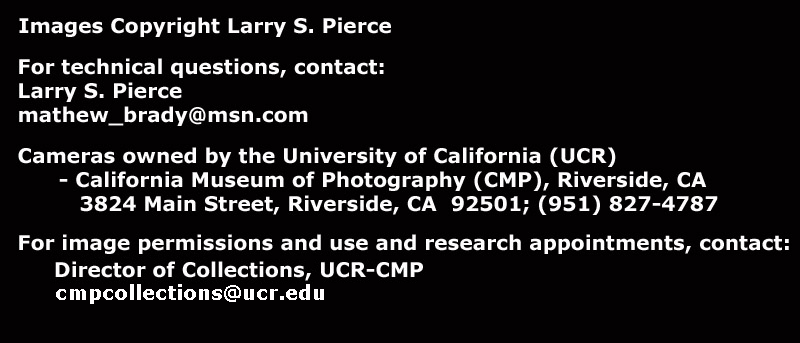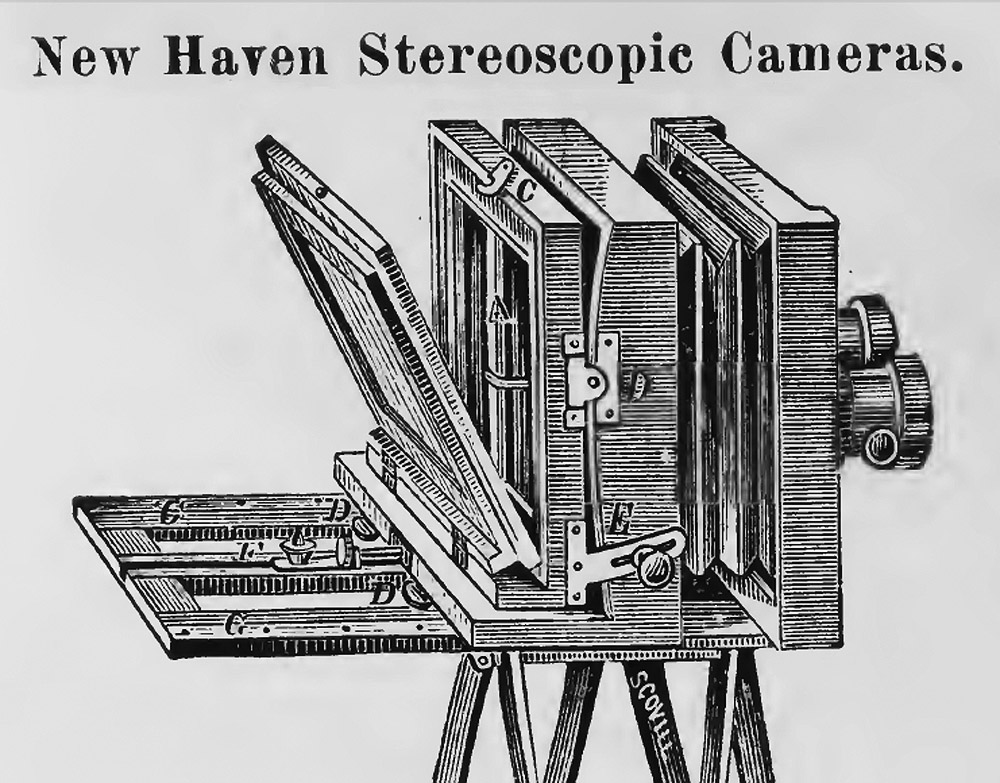Samuel Peck & Co. (New
Haven, CT factory)
Scovill Mfg. Co. (New Haven, CT
factory)
Samuel
Peck & Co. Stereoscopic View
Camera (wet plate version, c.1860's - c.1880)
Scovill Mfg. Co. New Haven Stereoscopic View Camera (dry plate version,
c.1880 - c.1884)
This camera exists both in a wet
plate version (c.1850-c.1880), probably called merely the
Samuel Peck & Co. Stereoscopic View Camera,
and an almost identical dry plate version (c.1880-c.1884), called the
New Haven Stereoscopic View Camera.
Samuel H.
Peck manufactured Daguerreian images, cases, and ~1850-1860 wet-plate
cameras in a factory located in New Haven, CT. He entered into a partnership with Scovill Mfg. Co. in 1857
and sold the company to them by 1860. After the purchase, Scovill
continued to manufacture cameras in the New Haven factory. Samuel
Peck & Co. still issued catalogs during the 1870's, one of which is
housed at The Smithsonian. The cameras produced during that period
apparently continued to be stamped with Samuel Peck & Co. stamps, as no
example of Peck-like cameras from that era have been observed bearing a
Scovill stamp - a stamp, for instance, like "American
Optical, Scovill Mfg. Co., Proprietors", a
common label and stamp used for cameras made in the factory formerly
owned by the American Optical Co., another camera-manufacturing company
purchased by Scovill.
In 1884, a Scovill catalog (Descriptive Catalogue and Price List of the
Photographic Apparatus Manufactured by the American Optical Co.,
Scovill Mfg. Co., proprietors and managers (New York, NY), Sept.
1884 catalog (pp. 74-77) has four pages of
cameras called New Haven
cameras that appear to be old Peck wet plate designs adapted for dry
plates. It would appear that Scovill was, at that time, making
Scovill cameras of their own design at their Waterbury, CT factory, and
also making cameras of Peck design at the former Peck factory in New
Haven CT, but had decided to stamp the New Haven factory cameras with a
Scovill stamp, but thought that by keeping New Haven in the model name,
those cameras would have the same cachet as a Peck-marked camera.
During this same period, the American Optical
factory in New York City manufactured the
American Optical Philadelphia Stereo Box,
a camera having the "Scovill"-containing label as described above.
The
Philadelphia Stereo Box
is close to identical to the
New Haven Stereoscopic View
Camera
- close enough that the exact same engraving is used to illustrate each
camera in the same 1884 catalog. Since the
American Optical
Philadelphia Stereoscopic Camera
was introduced in 1870 (see reference below), ten years after Samuel
Peck & Co. was purchased by Scovill, it is possible that the design
originated with Peck, and that the
Peck Stereoscopic View
Camera
is the precursor of the
Philadelphia Stereoscopic
Camera.
After 1884, the old Peck designs and the
New Haven
name dropped from the catalogs. Therefore, we can conclude that,
about 1885, the New Haven factory stopped making their Peck designs, and
started to manufacture Scovill designs stamped with Scovill stamps.
Below, an engraving of the
New Haven Stereoscopic Camera,
a dry-plate version virtually identical to the examples below of the
wet-plate Samuel Peck & Co. camera. Note that the ground glass
frame on the dry plate camera in the engraving appears to be thinner
than the ground glass frames in the two wet plate camera examples.
Dry plate holders generally were thinner than wet plate holders.
5 x 8"
camera , one of two examples of the
Peck Stereoscopic View Camera,
Assembly No. 3, having a Samuel Peck & Co. stamp - the wet plate
precursor of the dry plate
New Haven Stereoscopic View Camera. Bottom
Stamp on the
rear base rail: "Manufactured by Samuel Peck & Co." Stamp on the
lens board: "Otto Loehr Manufacturer New York"
Stamped assembly number "3" on the lower part of the movable frame of
the front standard (top) and on the lower part of the fixed part of the
front standard (bottom)
The second of two examples of
the Peck wet plate version of the New Haven Stereoscopic View Camera: 5 x 8
Assembly No. 6 having a brass, oval label. Label on the
upper front standard, engraved: "Sam'l Peck & Company / New Haven,
Conn." Assembly
number "6" stamped on the lower part of the rising part of the front
standard (top) and on the fixed part of the front standard (bottom).
The font and size seen here is the same as on two other Peck cameras, a
half-plate Peck Studio Camera
(LP49)and a full-plate, single lens
Peck Field View Camera (LP684). Wet-plate
stains where the plate holder was placed during exposure. Date Introduced: - ;
Years Manufactured: c.1860's -
c.1880 This camera is nearly identical to
the
American Optical Philadelphia Stereo Box, and since Peck
sold out to Scovill in 1860, and the
American Optical Philadelphia Stereoscopic Camera was
introduced in 1870, the Peck Stereoscopic
Camera may very well be the precursor of the
American Optical Philadelphia Stereoscopic Camera.
The dates suggested here assume this is so. Upper Camera The camera itself is
stamped: "Manufactured by Samuel Peck & Co", whereas
the lens board is stamped: "Otto Loehr Manufacturer New
York". From about 1869, Otto Loehr had a factory (or more
correctly, a shop, since the business of cabinet-making, in which Loehr
was trained, was done by hand in small amounts) manufacturing
photographic apparatus and camera boxes at 131 and 133 Mercer St., New
York, NY (per page 22 of the 1871-1872 Annual Report of The American
Institute of the City of New York). About October, 1874, that
factory burned down (Photographic Times Vol. IV No. 46, October
1874, p.160). The Loehr lens board appears to have been made for this camera (not
cut down from a larger lens board), and is the same color, luster and
has the same patina as the remainder of the camera. It is
certainly contemporaneous with the camera, if not the only lens board
the camera has ever had. The sticker identifies it as formerly in the
Kessler collection by way of the Hillan collection. Hopefully,
the glue on the sticker is reversible; a more classic marking system
would be a smaller paper label held on using soluvar, a modern
formulation readily soluble in paint thinner, which will not harm old
shellac or varnish, such as the tags now installed on the underside of
the carriage, on the back side of the lens board, and on the inside
cover of the case (every detachable piece) that identify this item as
LP718. The wooden case is certainly period, although it may be the work
of the owner or a craftsman rather than the factory. Lower Camera The camera wood is not stamped as above, but, instead,
an oval brass label proclaims the manufacturer. Otherwise, it is
identical to the other camera. Both the upper and lower cameras have identical
brand Petzval-type lenses engraved: Gasc.
& Charconnet Geo. S. Bryant & Co. Sole Agents Boston, Mass.
This can hardly be a coincidence. Undoubtedly, Peck had an
arrangement with Geo. S. Bryant to supply lenses for their cameras.
This also means that both of the above cameras have their original
lenses. References:
Back to Miscellaneous Camera Companies
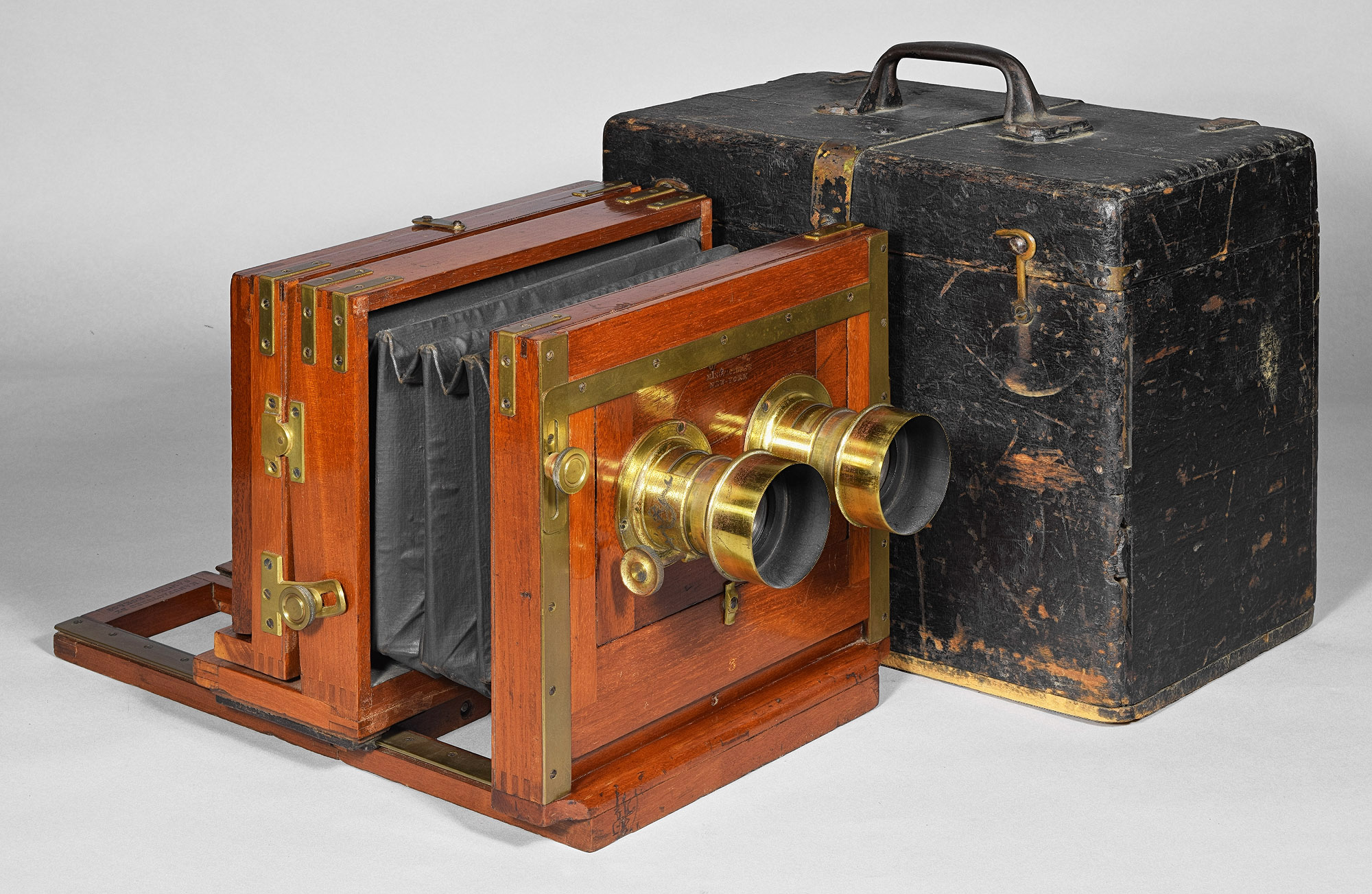
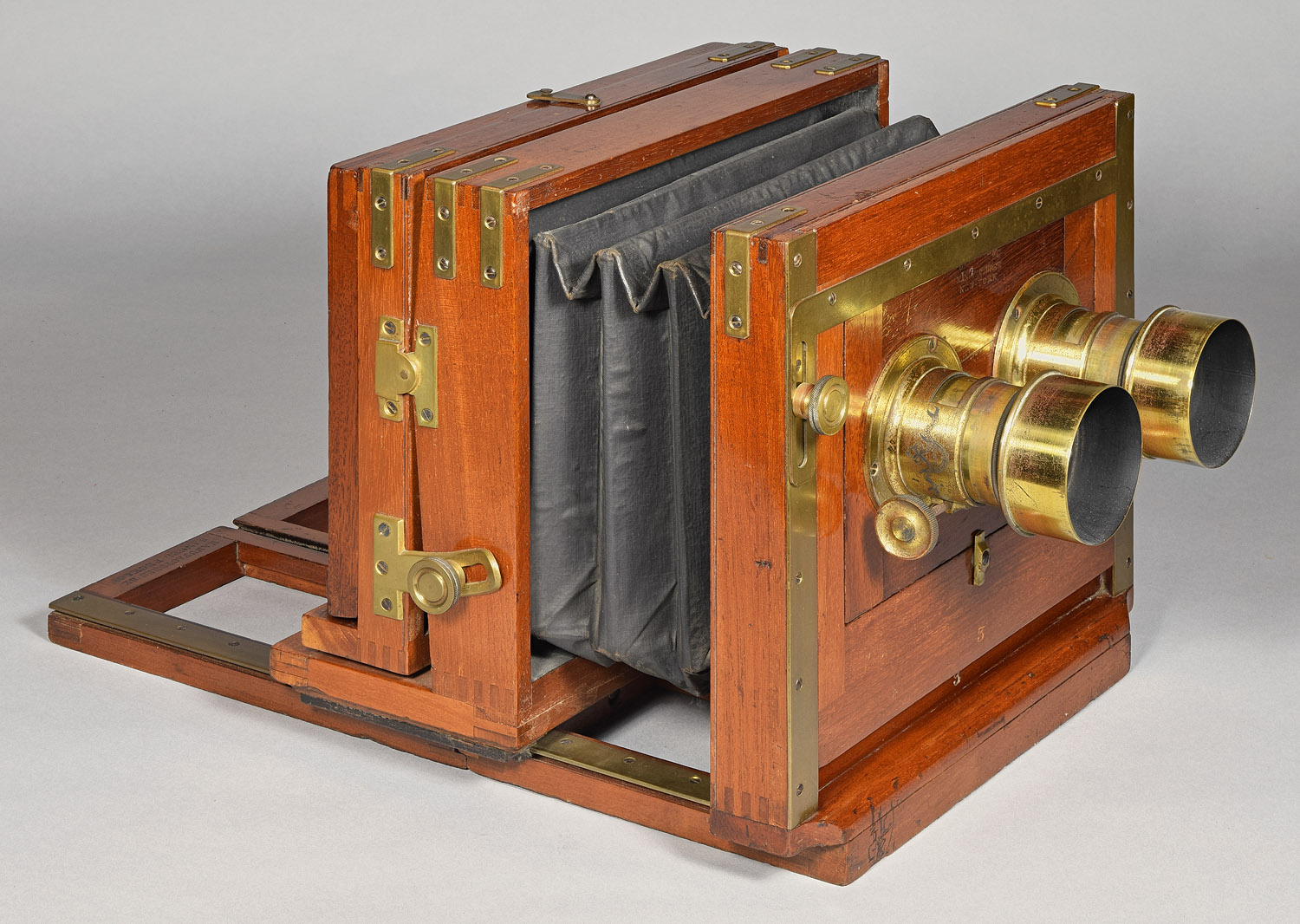
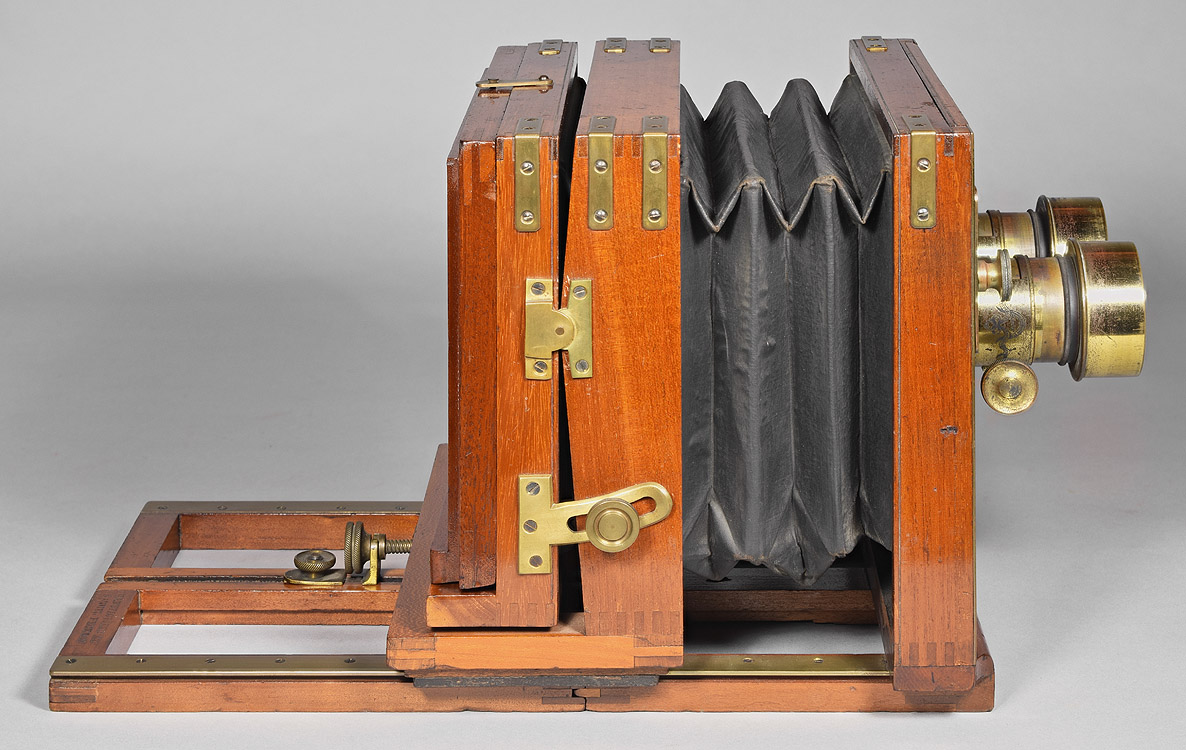
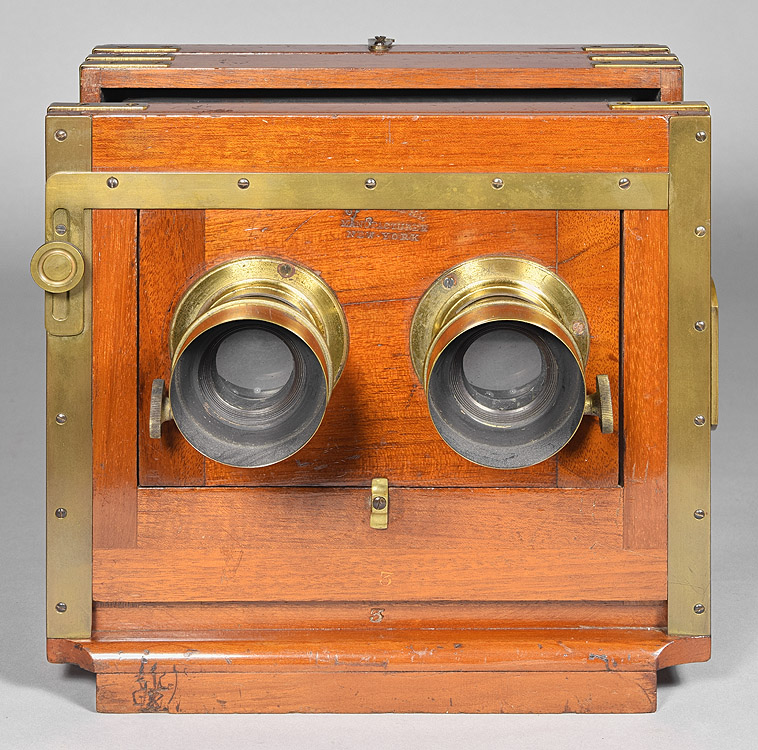
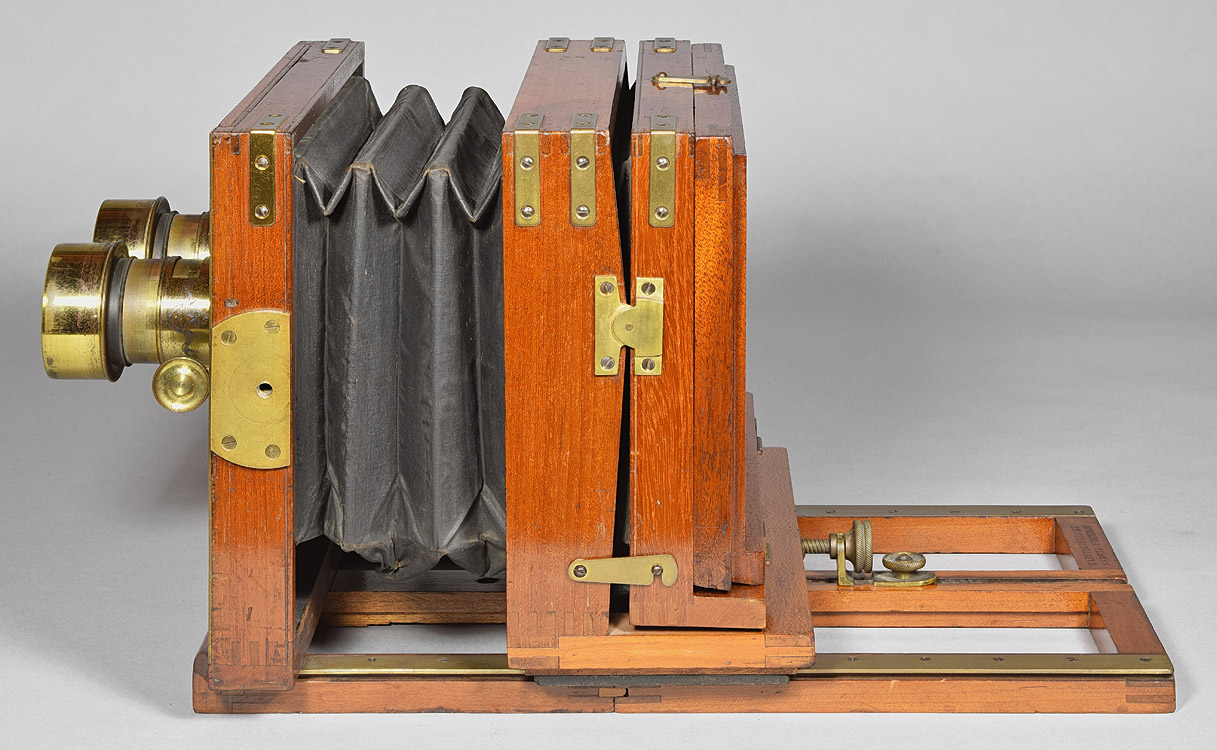
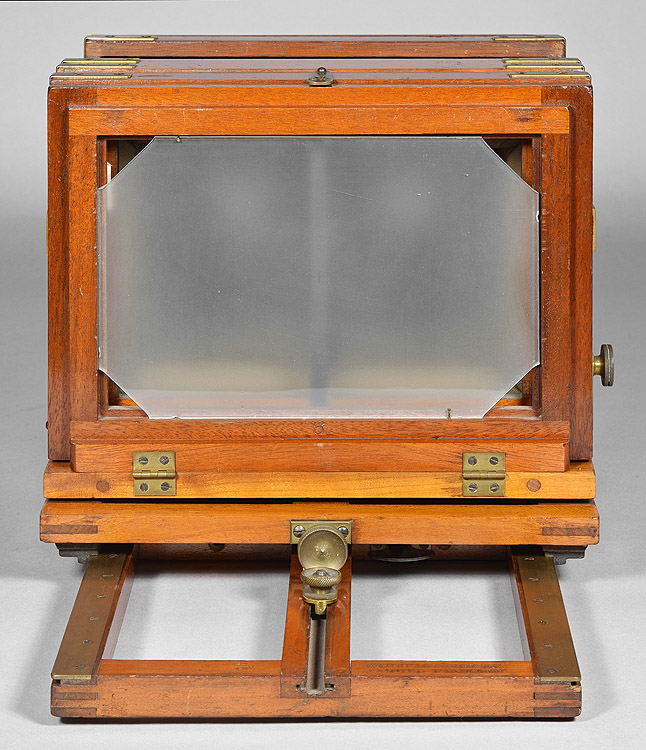
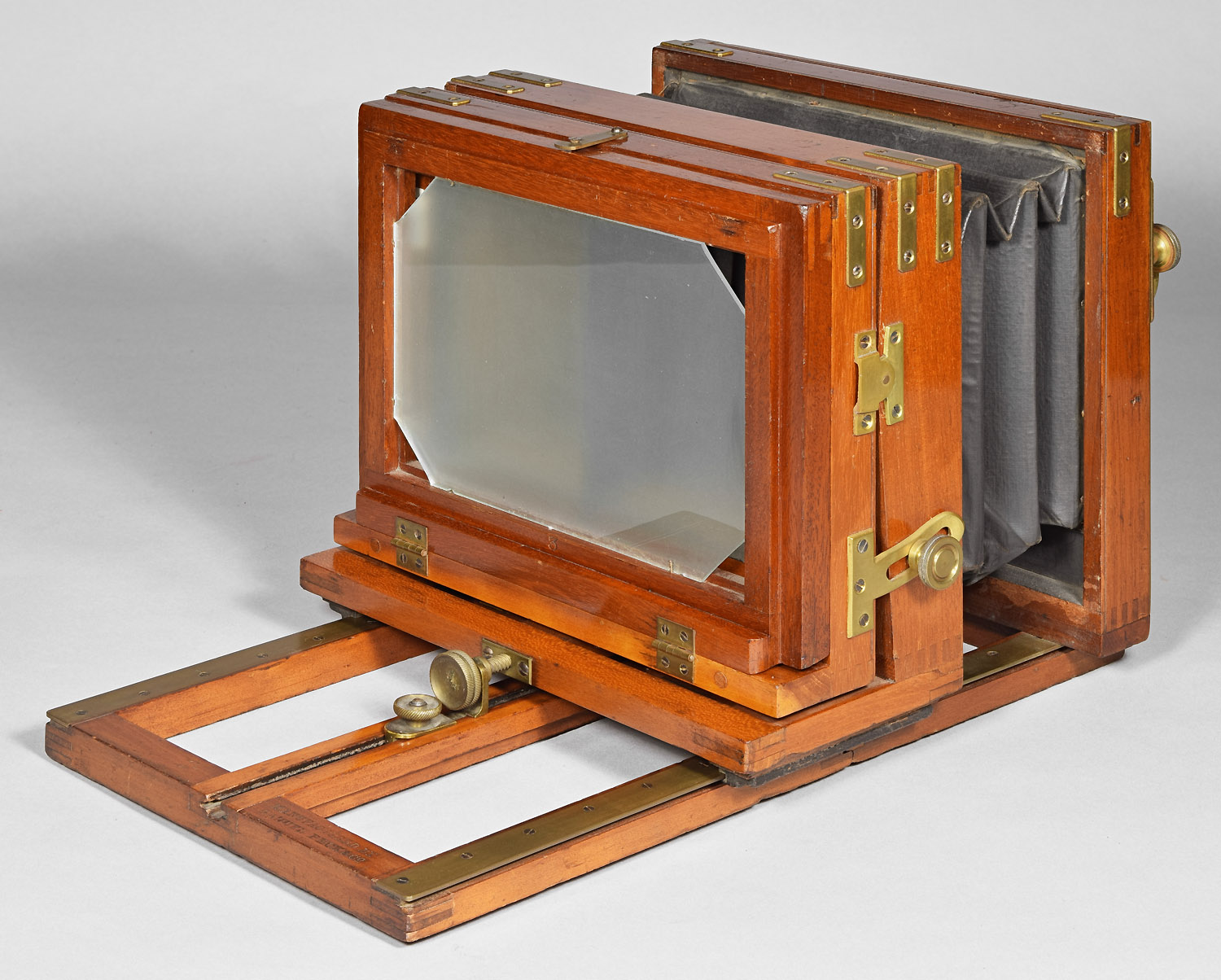
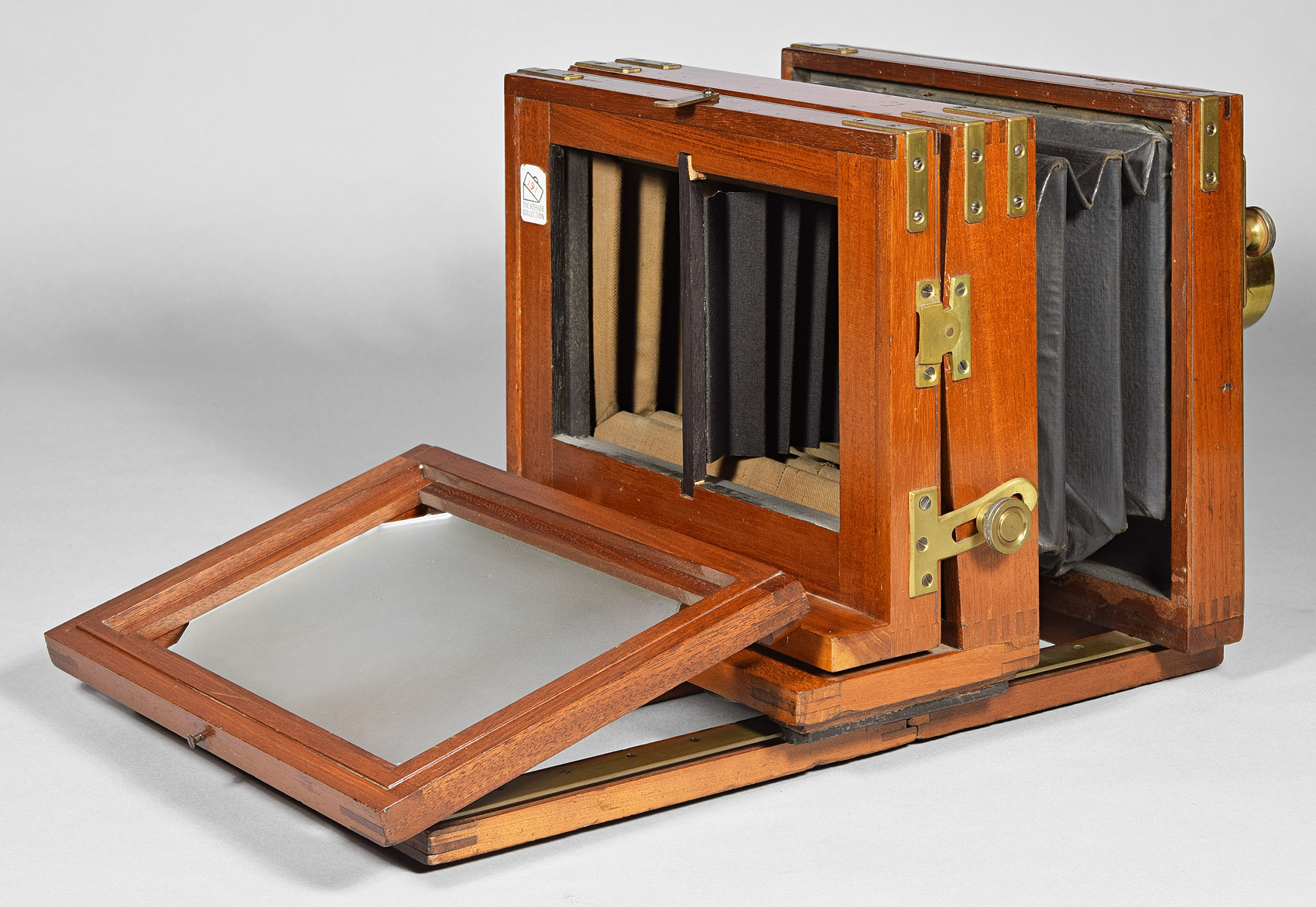
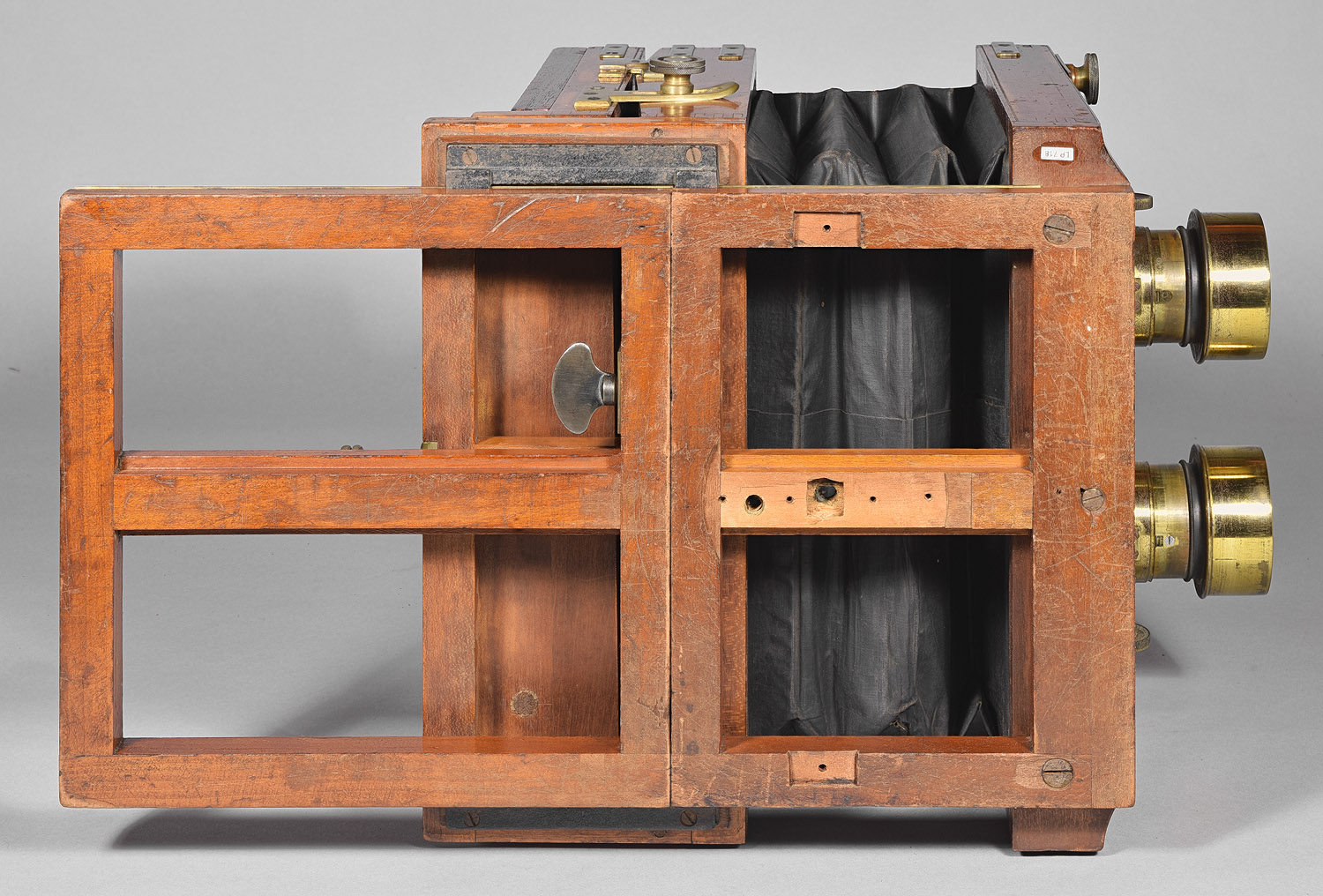

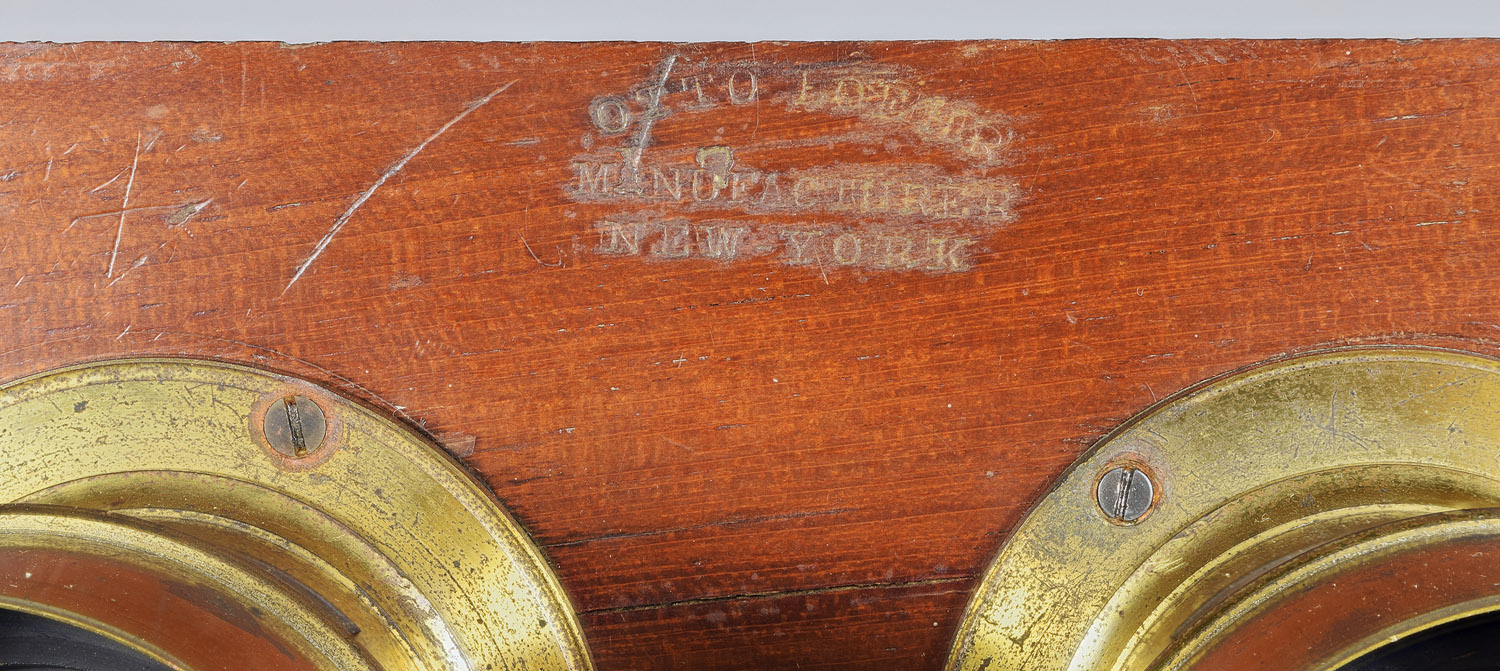
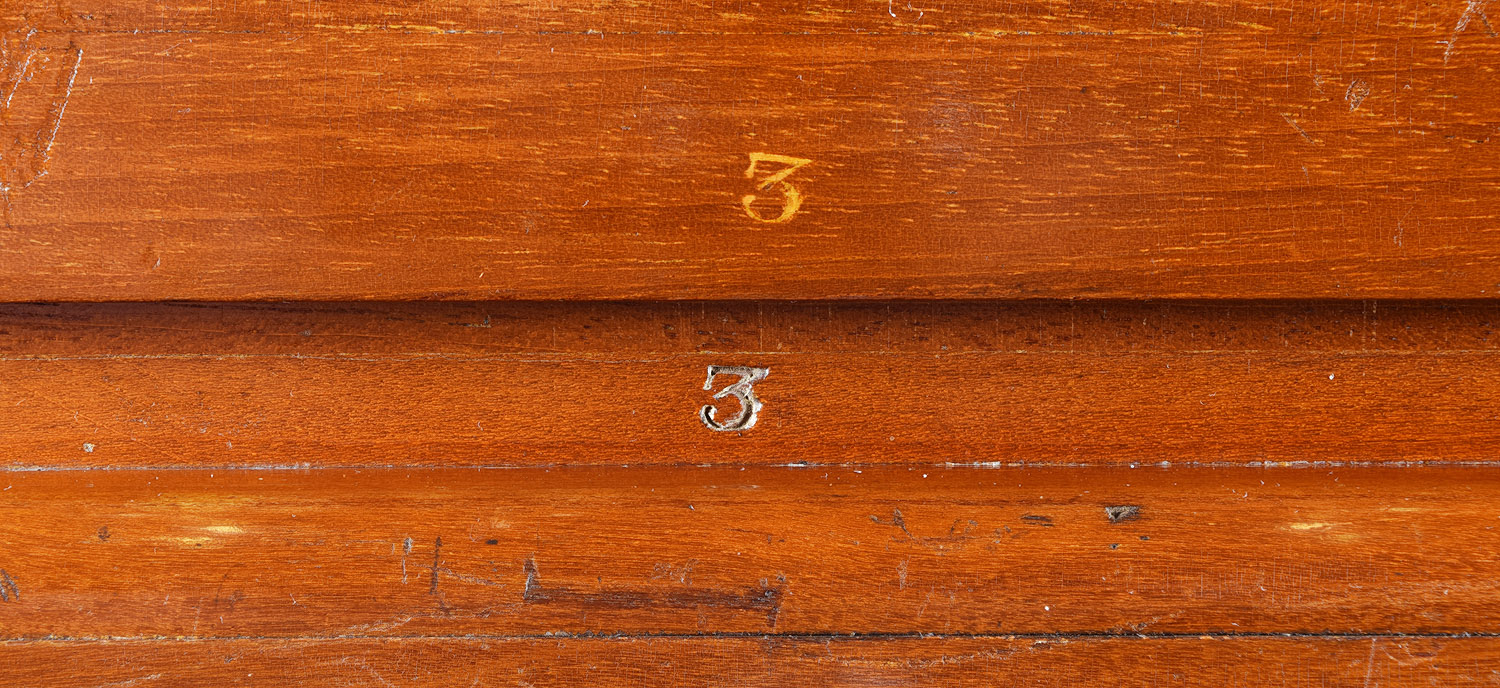
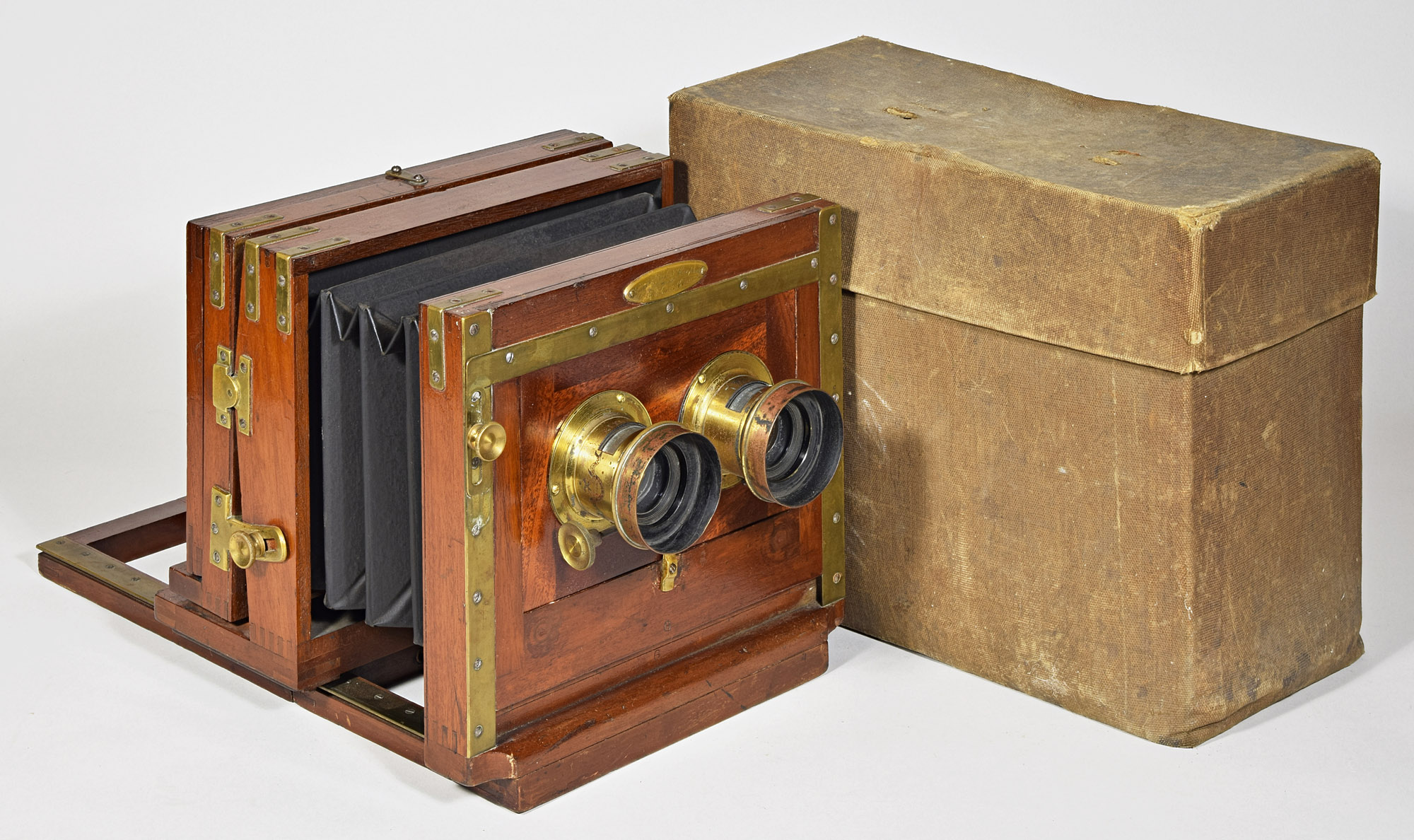
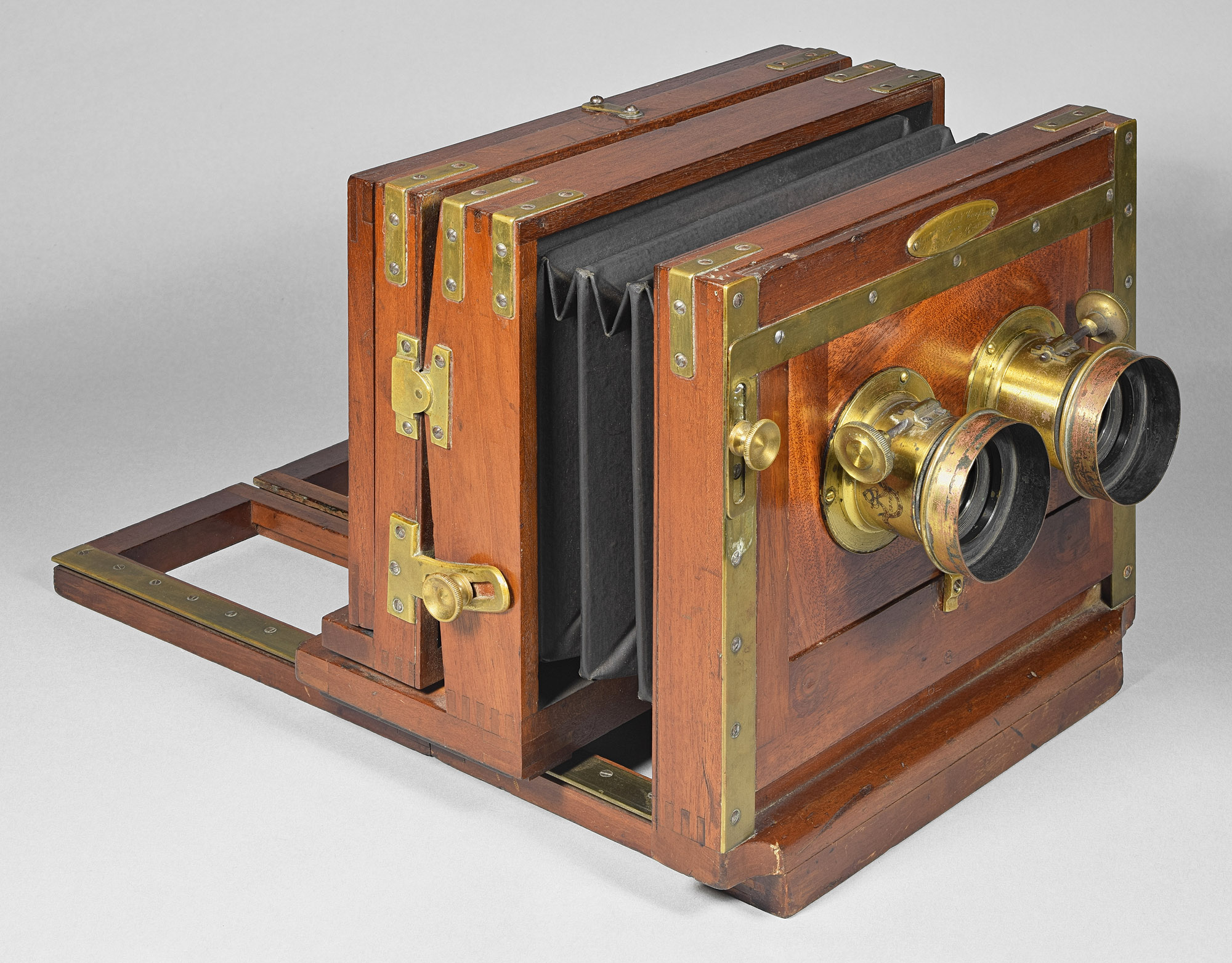
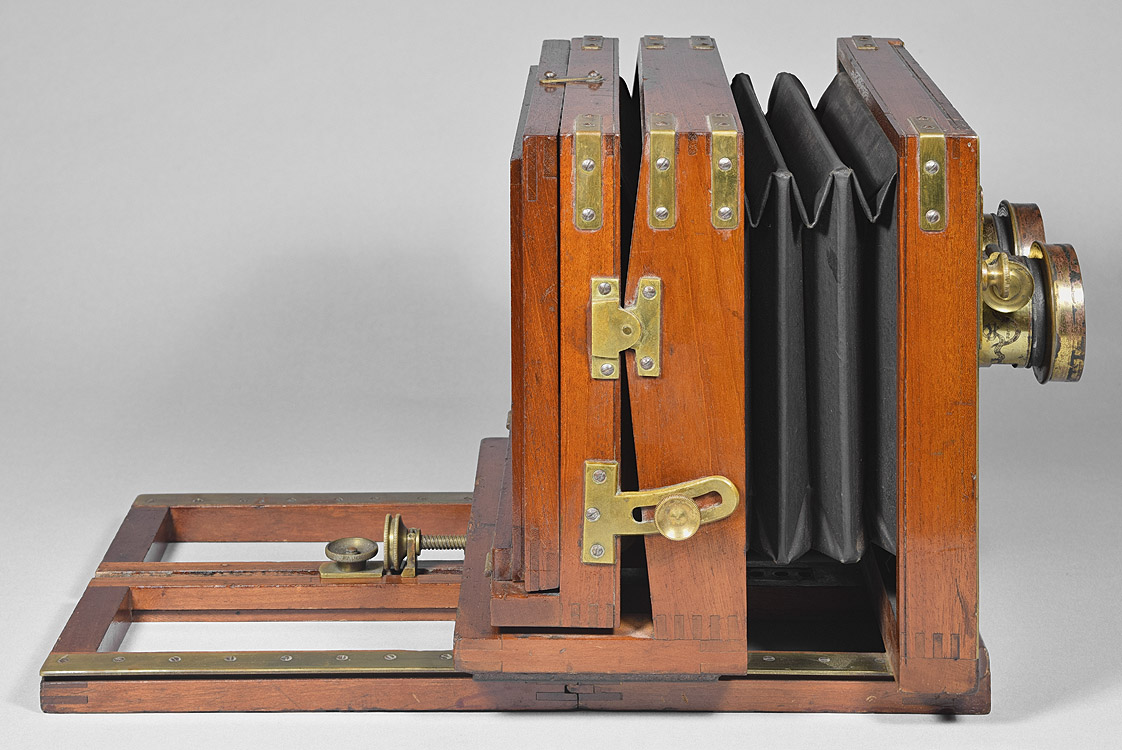
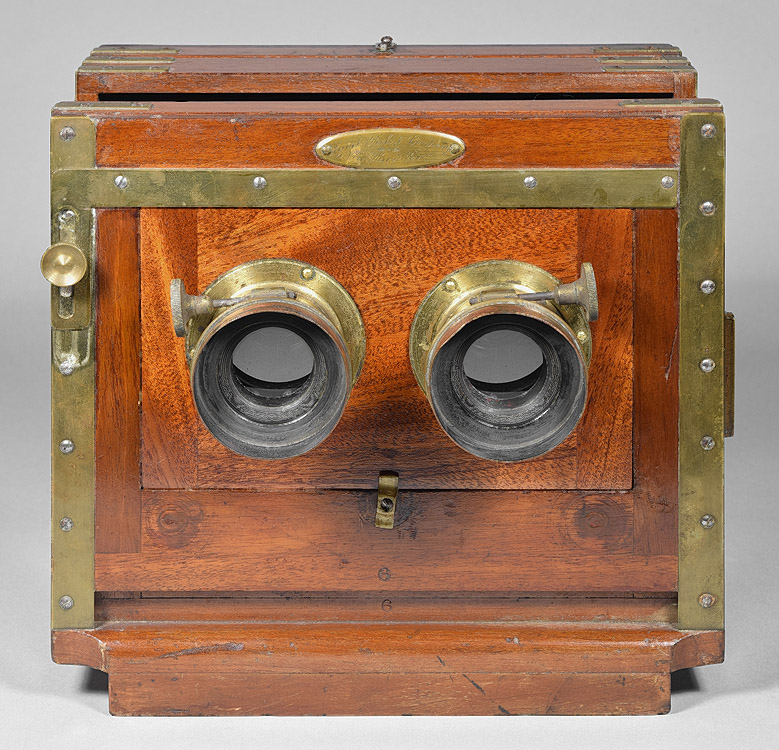
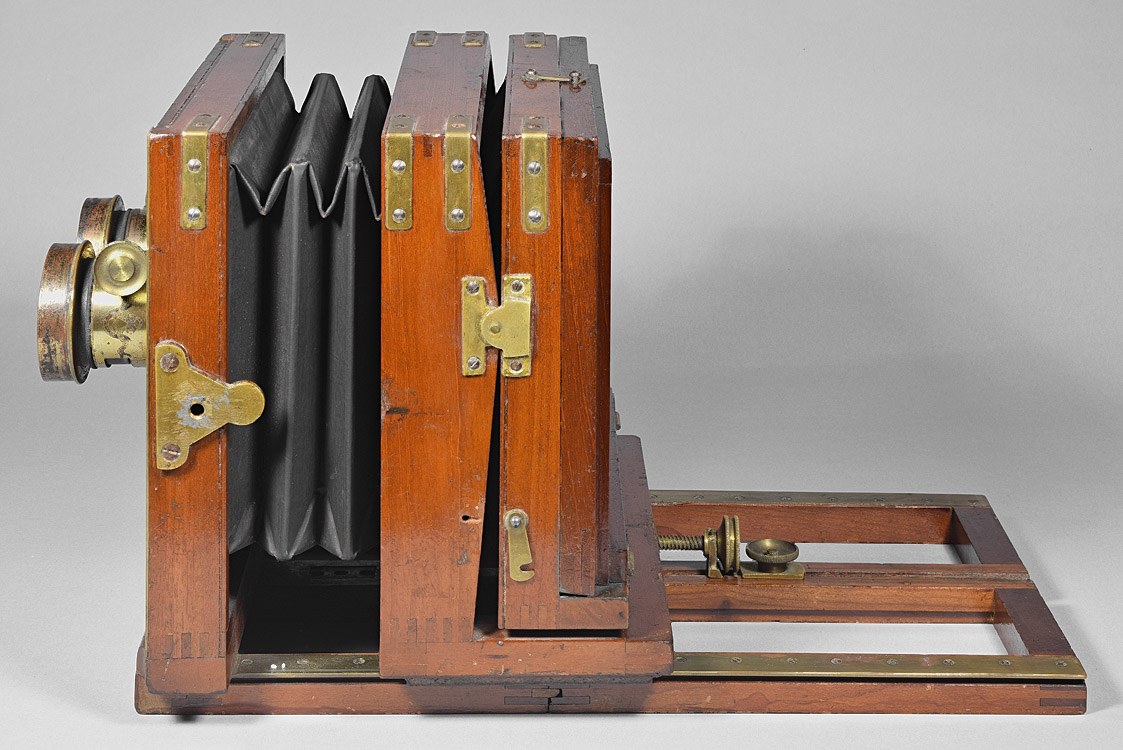
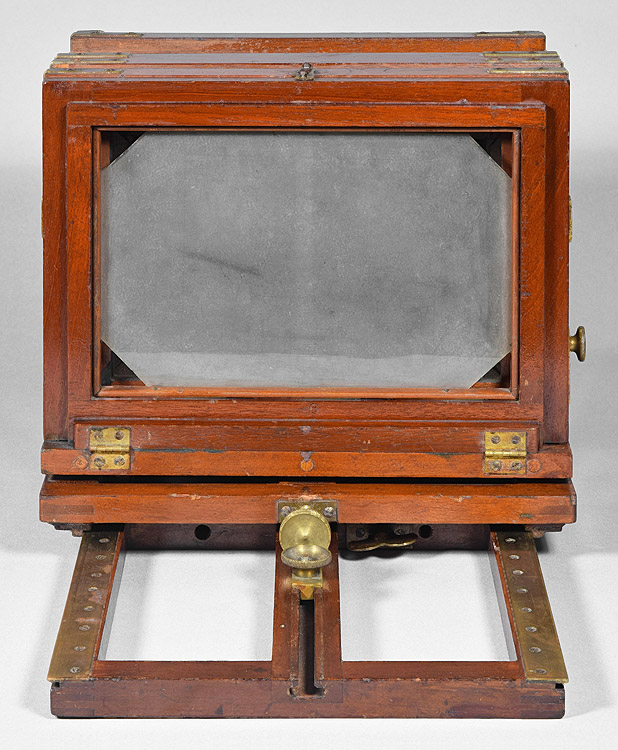
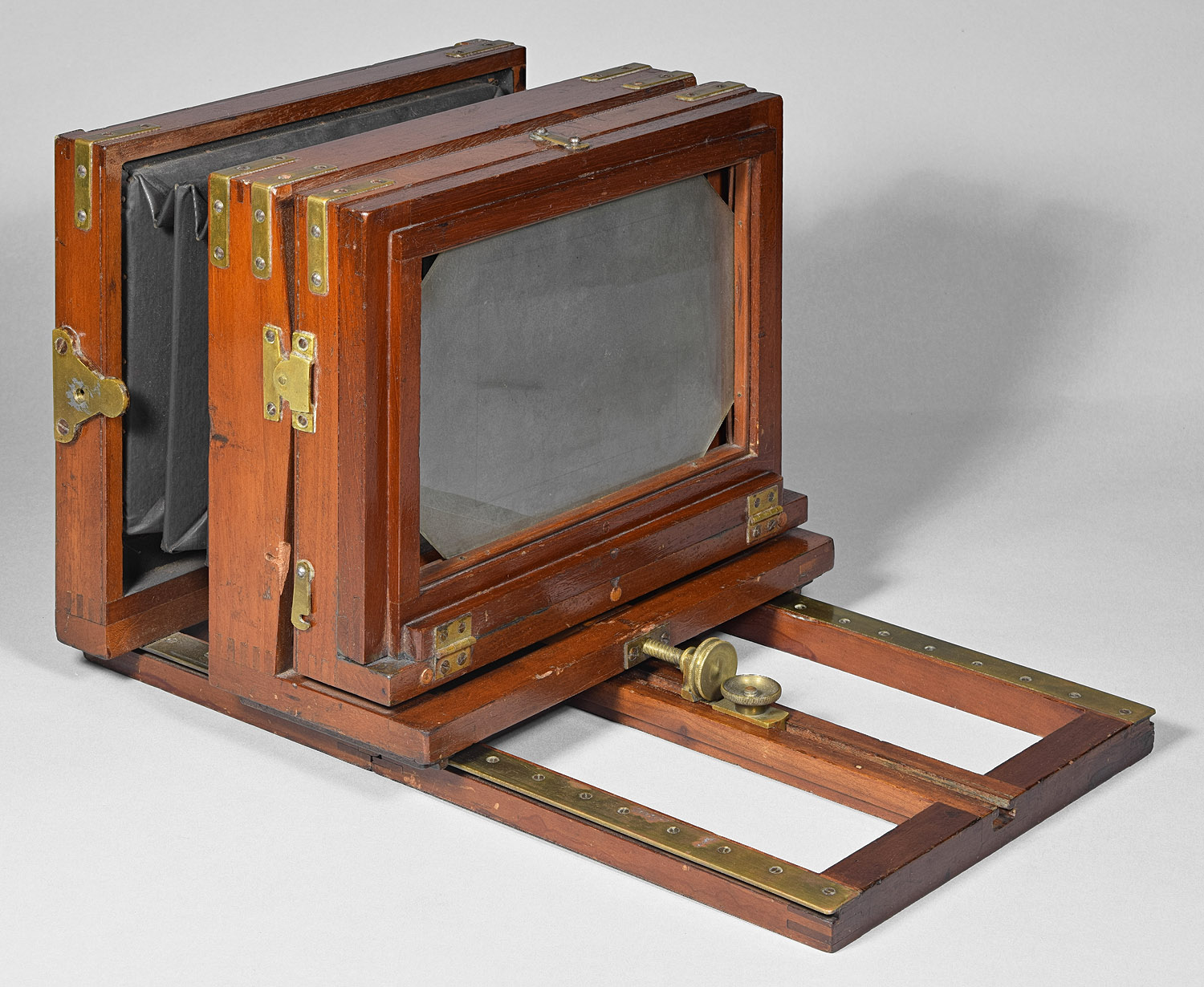
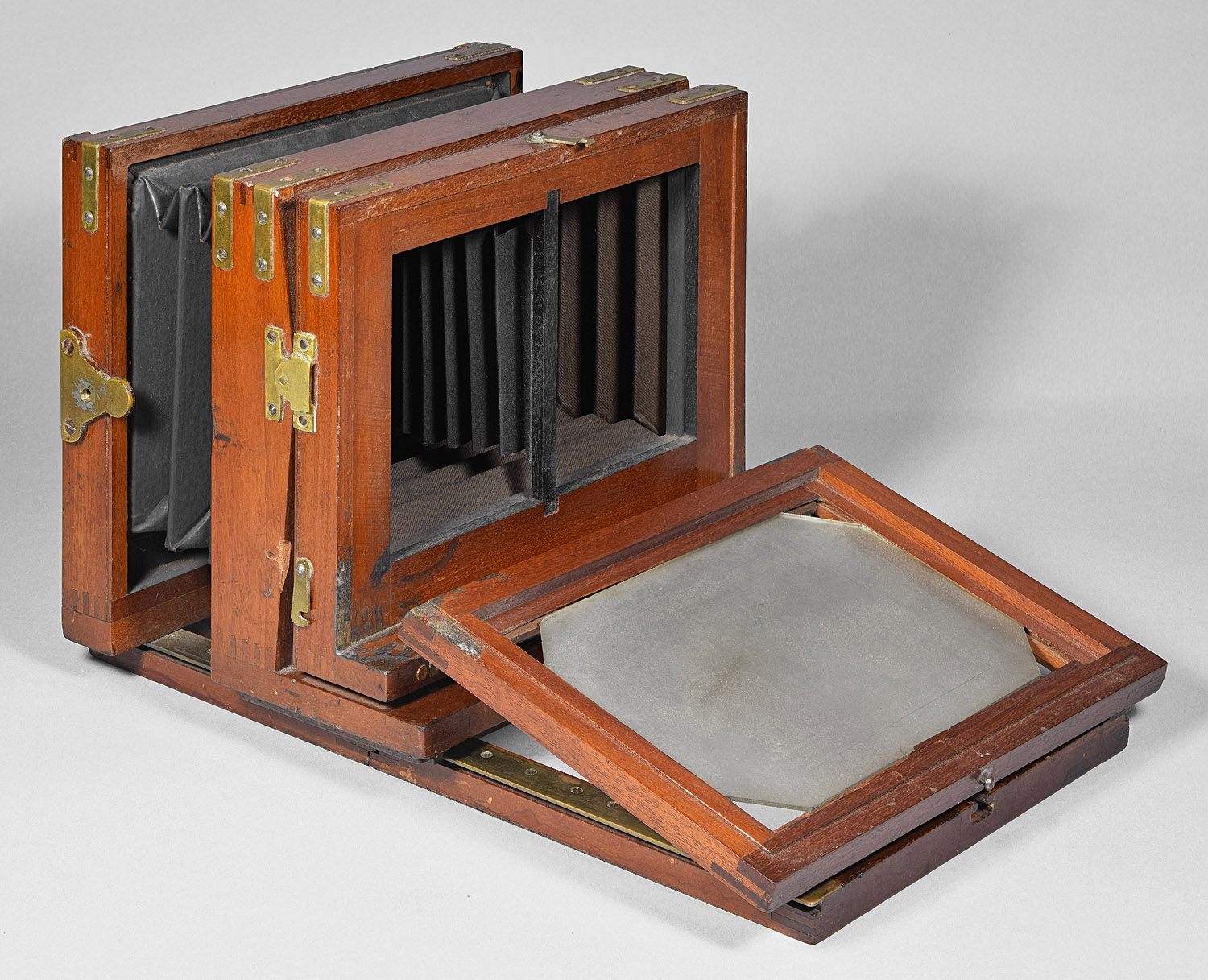
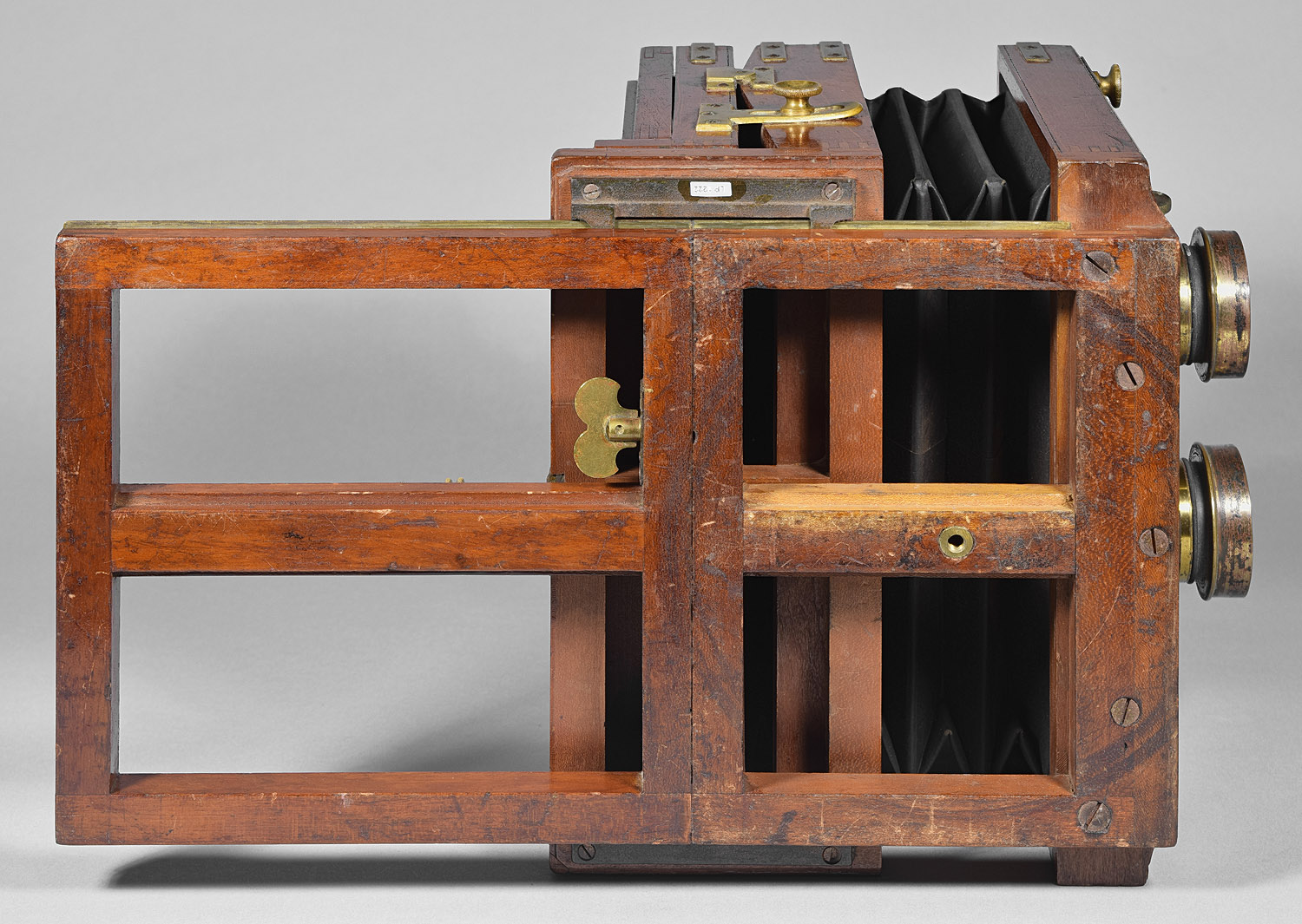
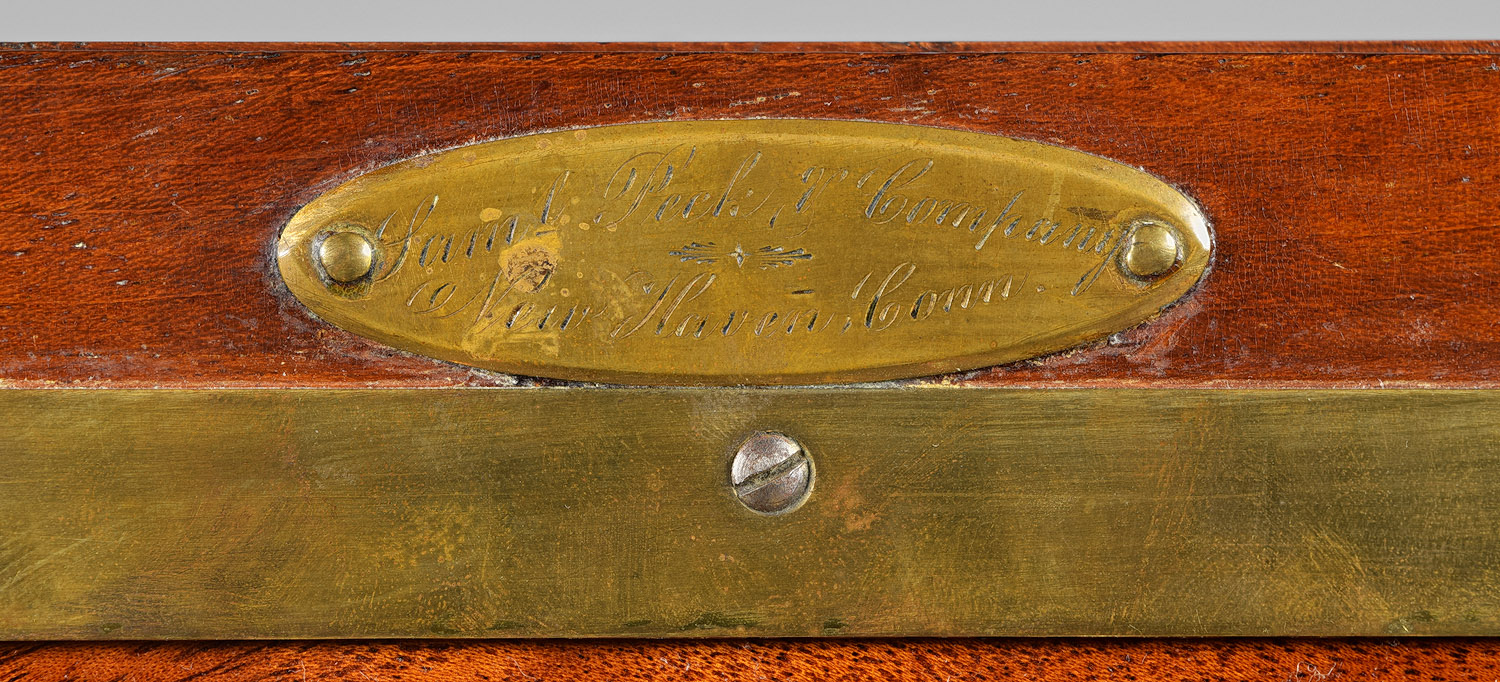
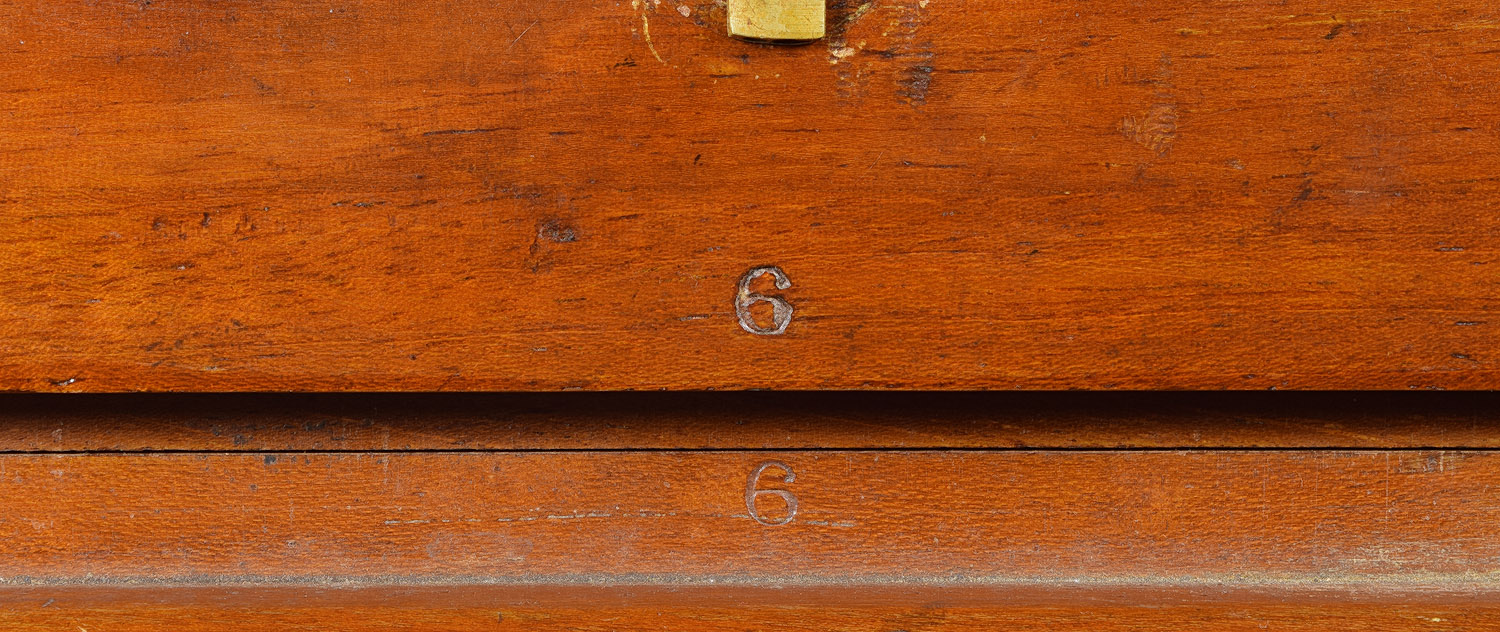
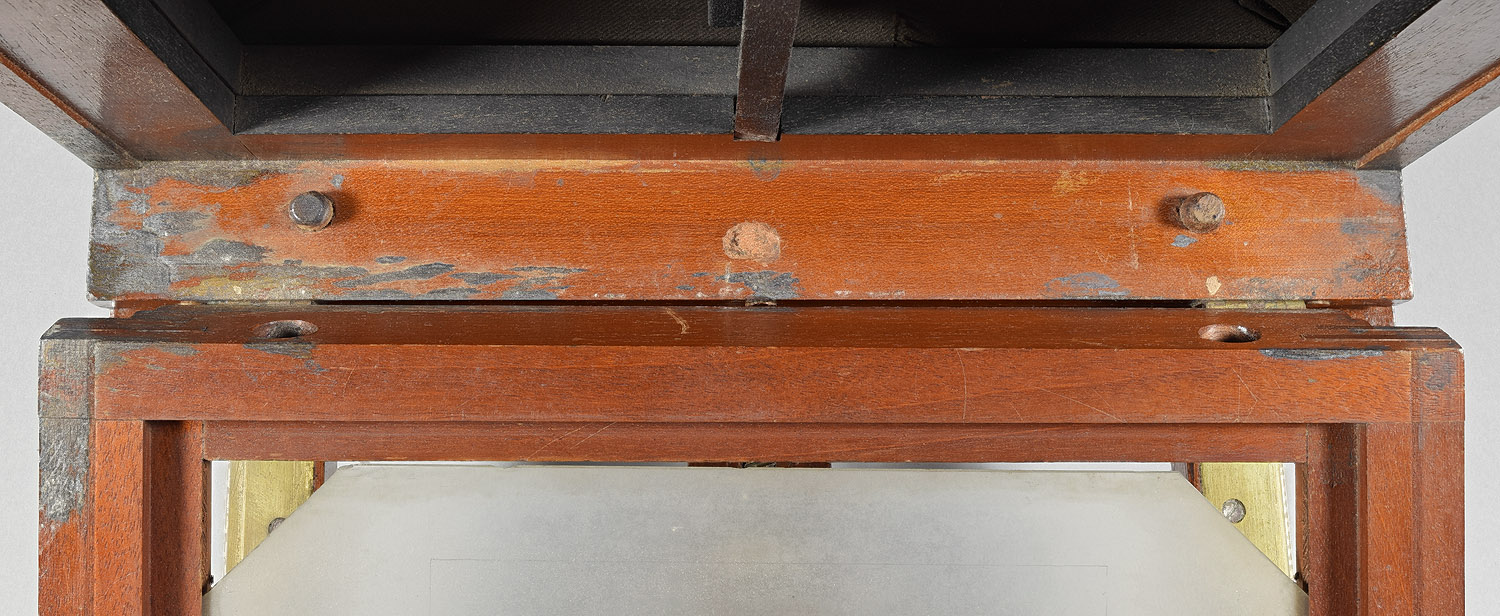
Construction: rear
focus via push-pull with focus screw; single
swing; reversing by second tripod mount.
Materials: mahogany body;
cherry base; black fabric bellows; brass
hardware, three-piece lens board.
Sizes Offered: at least 5x8
(Peck); 4x7; 4x8;
5x8 (New Haven)
Notes:
Philadelphia Photographer, April, 1870, p. 100 (introduction of
the
American Optical Philadelphia Stereoscopic Camera)
Descriptive Catalogue and Price List of the Photographic Apparatus
Manufactured by the American Optical Co., Scovill Mfg. Co.,
proprietors and managers (New York, NY), Sept. 1884, p.76
(Scovill Mfg. Co. New Haven
Stereoscopic Camera)
